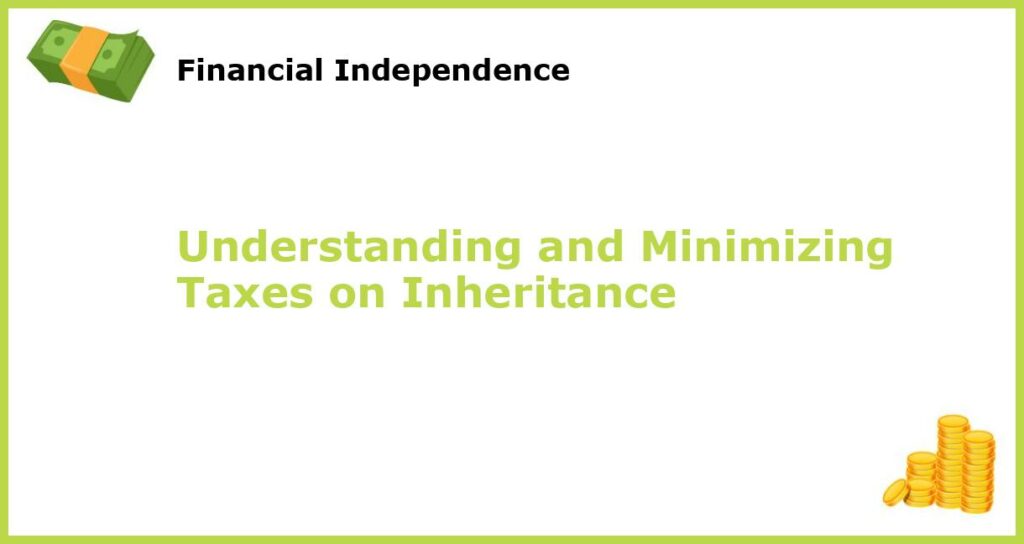Inheritance taxes, also known as estate taxes, can become a burden for some people who receive assets from a deceased loved one. It is important to be aware of the various intricacies that inheritance taxes entail to plan accordingly to reduce the tax liability. Inheritance taxes are taxes that are charged on the transfer of property from the deceased person to their respective heirs. The rate of tax is determined by the value of the property transferred, and the different tax rates are determined by the state or country in which it is levied.
What are Inheritance Taxes?

Inheritance taxes are basically taxes imposed on the transfer of assets from a deceased person to their heirs. This tax not only affects the individual transferred the property but also the heirs. The amount of taxes assessed is calculated based on the fair market value of the inherited assets at the time of their transfer. The tax rates may vary by state or country, with some places having no inheritance tax at all.
How do Inheritance Taxes Work?

The amount of inheritance tax paid by the heirs relies on the fair market value of the property given in property, among other factors such as the jurisdiction in which the inheritance tax is levied. In cases where there is no inheritance tax exemption, the amount of tax owed can significantly affect the transfer of assets from the deceased to the heirs. This poses a problem when the tax liability is more than the value of the property.
Are There any Exemptions to Inheritance Taxes?
Yes, in many cases, there are exemptions or deductions that can help minimize the amount of inheritance tax owed. These exemptions can vary from deductions for certain expenses related to the estate or inheritance, and in some cases, the exemption of certain assets such as a primary residence. Some jurisdictions also provide exemptions for bequests transfers to spouses or charities. The use of exemptions and deductions can minimize the amount of inheritance tax that the heirs owe considerably.
How Can You Minimize your Inheritance Tax Liability?
One effective approach for minimizing inheritance tax liability is through estate planning, and this is done by the use of trusts or other estate planning strategies in which an individual transfers assets into a trust or other legal entity. When transferring assets into a trust, individuals can pass those assets to their heirs without triggering as much tax liability as they would otherwise. This is especially helpful when considering different tax liabilities in different states or jurisdictions.
What Role Do Estate Planning Attorneys Play in Inheritance Tax Planning?
Estate planning attorneys play a crucial role in the planning process to minimize inheritance tax liability. They work with individuals and their families to develop effective strategies to reduce and minimize tax liabilities by navigating complex legal requirements, helping to create legal trusts, and making the best of available tax incentives. This way, individuals can manage their estates effectively and ensure that their beneficiaries, whom they choose, get the most out of it without unnecessary tax liabilities.
What are Some Common Mistakes People Make When Planning for Inheritance Taxes?
One common mistake people make when planning inheritance taxes is by failing to plan at all. People who don’t plan for inheritance taxes can end up incurring an enormous amount of tax liability, which could have been avoided entirely with proper planning. Other mistakes people make include failing to take advantage of available exemptions and deductions or neglecting to update their estate planning documents to reflect changing circumstances.
What is the Role of Accountants in Inheritance Tax Planning?
Accountants play a significant role in helping individuals to plan inheritance taxes by identifying opportunities to reduce tax liability. Their role is especially important since they work in tandem with estate planning attorneys to help with the creation of the estate plan by identifying tax-efficient investments, the recognition of the optimal timing of asset transfers, and providing appropriate tax deductions and exemptions.
What are Some Strategies for Reducing Inheritance Taxes?
Several strategies can be used to minimize the tax liability of inheritance taxes effectively. One of the most common strategies is to gift assets during one’s lifetime. Creating trusts to transfer assets in a tax-free way is also another strategy, and another is using life insurance to pay for estate taxes. Finally, transferring assets to a charitable organization and taking advantage of available tax deductions and exemptions can help to significantly minimize inheritance taxes.
What is the Difference Between an Estate Tax and an Inheritance Tax?
Estate taxes and inheritance taxes are two sides of the same coin. Estate taxes are taxes levied on the estate of an individual after their death regardless of whether the estate is transferred to heirs or donated to charity. In contrast, inheritance taxes are taxes levied exclusively on the transfer of assets to heirs. Different states and countries have different levies on estate and inheritance taxes.
How Can Financial Planners Help with Inheritance Tax Planning?
Financial planners, through the implementation of effective tax-efficient plans, can help individuals, and their respective families, identify tax-minimization opportunities and create a sustainable financial plan that takes into account the impact of inheritance taxes. Financial planners can work together with estate planning attorneys and accountants to create the best tax-minimization plan that is consistent with the individual’s estates, in line with their wishes, and which takes into account the associated tax implications.







